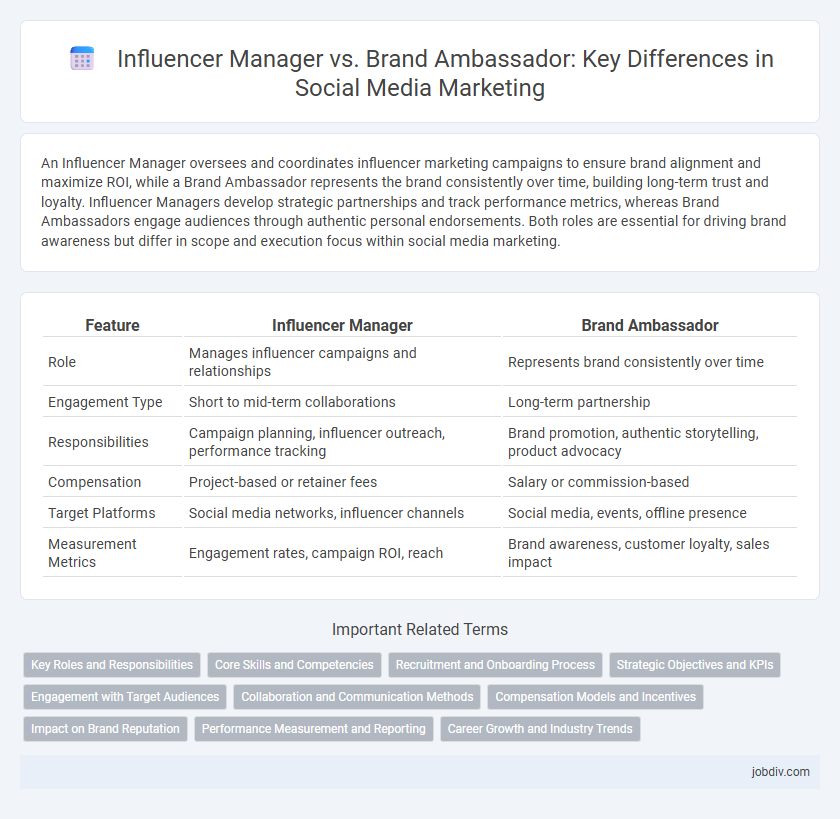An Influencer Manager oversees and coordinates influencer marketing campaigns to ensure brand alignment and maximize ROI, while a Brand Ambassador represents the brand consistently over time, building long-term trust and loyalty. Influencer Managers develop strategic partnerships and track performance metrics, whereas Brand Ambassadors engage audiences through authentic personal endorsements. Both roles are essential for driving brand awareness but differ in scope and execution focus within social media marketing.
Table of Comparison
| Feature | Influencer Manager | Brand Ambassador |
|---|---|---|
| Role | Manages influencer campaigns and relationships | Represents brand consistently over time |
| Engagement Type | Short to mid-term collaborations | Long-term partnership |
| Responsibilities | Campaign planning, influencer outreach, performance tracking | Brand promotion, authentic storytelling, product advocacy |
| Compensation | Project-based or retainer fees | Salary or commission-based |
| Target Platforms | Social media networks, influencer channels | Social media, events, offline presence |
| Measurement Metrics | Engagement rates, campaign ROI, reach | Brand awareness, customer loyalty, sales impact |
Key Roles and Responsibilities
Influencer Managers oversee the strategy and execution of influencer marketing campaigns, managing relationships with multiple influencers, coordinating content creation, and analyzing campaign performance to maximize brand reach. Brand Ambassadors represent a brand by authentically promoting products or services, often through personal social media channels, engaging directly with audiences to build trust and brand loyalty. While Influencer Managers focus on campaign management and strategic partnerships, Brand Ambassadors emphasize consistent brand representation and community engagement.
Core Skills and Competencies
Influencer Managers excel in strategic campaign planning, data analytics, and relationship management to optimize brand collaborations and ROI. Brand Ambassadors showcase strong communication, authenticity, and product knowledge to create genuine connections with target audiences. Both roles require adaptability and social media expertise, but Influencer Managers prioritize project coordination while Brand Ambassadors focus on personal brand alignment.
Recruitment and Onboarding Process
Influencer managers streamline the recruitment and onboarding process by utilizing data-driven strategies and automated tools to identify and engage high-potential influencers efficiently. Brand ambassador programs often involve a more personalized recruitment approach, emphasizing brand alignment and long-term relationship building during onboarding. Both methods prioritize clear communication and training to ensure ambassadors or influencers effectively represent brand values and campaigns.
Strategic Objectives and KPIs
Influencer Managers focus on cultivating long-term relationships with influencers, aiming to maximize brand reach and engagement through strategic campaigns measured by KPIs like follower growth, engagement rates, and conversion metrics. Brand Ambassadors embody the brand's identity, promoting products authentically to drive brand loyalty and awareness, tracked by metrics such as brand sentiment, repeat purchase rates, and customer retention. Both roles align with strategic objectives to enhance brand visibility and foster community trust, but Influencer Managers prioritize scalable influencer partnerships while Brand Ambassadors deliver consistent, relatable brand representation.
Engagement with Target Audiences
Influencer managers strategically coordinate campaigns to maximize authentic engagement by leveraging influencer networks that resonate deeply with target audiences. Brand ambassadors consistently represent a brand, fostering long-term trust and emotional connections through ongoing interactions with their followers. Both roles drive audience engagement, but influencer managers capitalize on diverse content creators for broader reach, while brand ambassadors enhance loyalty within niche communities.
Collaboration and Communication Methods
Influencer managers coordinate campaigns by leveraging direct communication channels such as emails, video calls, and project management tools to ensure clear alignment with brand objectives. Brand ambassadors engage through more personalized, continuous interactions on social media platforms, creating authentic connections with the audience while providing real-time feedback. Both roles prioritize transparent collaboration but differ in scale and strategy: influencer managers handle multiple creators and streamline workflows, whereas brand ambassadors maintain ongoing relationships to embody brand values consistently.
Compensation Models and Incentives
Influencer managers typically receive a fixed salary or a commission based on campaign performance, ensuring consistent compensation tied to measurable results, while brand ambassadors often earn through product discounts, free merchandise, or performance-based bonuses that motivate long-term brand loyalty. Compensation models for influencer managers emphasize direct financial incentives aligned with campaign success rates, whereas brand ambassadors benefit from a mix of monetary rewards and perks that foster authentic brand representation. Understanding these differing payment structures helps brands optimize their investment by aligning incentives with marketing goals and influencer engagement.
Impact on Brand Reputation
An Influencer Manager strategically selects and manages partnerships with influencers to ensure alignment with brand values and maximize positive exposure, directly enhancing brand reputation. Brand Ambassadors consistently represent and promote the brand through authentic, ongoing engagement, fostering trust and loyalty among target audiences. Together, these roles contribute to building a credible and influential brand image in the social landscape.
Performance Measurement and Reporting
Influencer managers leverage advanced analytics platforms to track engagement rates, conversion metrics, and ROI, enabling real-time performance optimization for influencer campaigns. Brand ambassadors typically focus on long-term brand loyalty and awareness, with performance measured through sentiment analysis and sustained customer interactions over time. Comprehensive reporting systems for influencer managers emphasize detailed campaign performance data, whereas brand ambassador programs prioritize qualitative impact and brand affinity metrics.
Career Growth and Industry Trends
Influencer Managers play a pivotal role in strategizing brand partnerships and analyzing engagement metrics to maximize campaign success, offering significant career growth opportunities within digital marketing and social media industries. Brand Ambassadors focus on authentic product promotion and community building, often gaining grassroots influence that can lead to long-term brand alignment and personal brand development. Industry trends show increasing demand for data-driven influencer management roles, while brand ambassadors continue to drive consumer trust through genuine connections.
Influencer Manager vs Brand Ambassador Infographic

 jobdiv.com
jobdiv.com